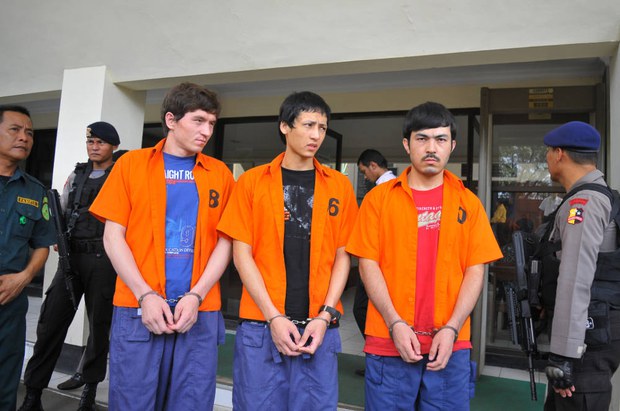Uyghur Man Arrested in Indonesia a Would-be Suicide Bomber: Reports
2016.01.06
 Indonesian police guard Uyghurs (L-R) Tuzer Abdul Basit, Altinci Bayram and Ahmet Mahmud after a Jakarta court convicted them on terrorism charges, July 13, 2015.
Indonesian police guard Uyghurs (L-R) Tuzer Abdul Basit, Altinci Bayram and Ahmet Mahmud after a Jakarta court convicted them on terrorism charges, July 13, 2015.
Indonesia has reportedly sought investigative help from China following the recent arrest of a Uyghur man with a suicide-bomb vest, but a Uyghur rights group has cautioned Jakarta to be careful in cooperating with Beijing on such cases.
The arrest was one of 13 in various parts of Java in the last two weeks of 2015, with police claiming they had disrupted a major plot backed by an Islamic State (IS) leader in Syria to attack public figures and places of worship in Indonesia.
“We are cooperating with China and investigating evidence such as ATM cards and cellphones,” Saud Usman Nasution, director of Indonesia’s National Counterterrorism Agency (BNPT), told Reuters in an interview Wednesday.
He added that an Indonesian team had gone to China to interview members of the man’s family, but they did not confirm they were related to him.
Groomed
The man was arrested on Dec. 23 in Bekasi, West Java, a city on the eastern outskirts of Jakarta, based on information obtained from an Indonesian national arrested in the same city earlier in the day.
The Indonesian man, identified as Arif Hidayatullah, was reportedly arrested on his way to work at an automotive company. He allegedly possessed a list of IS supporters in Indonesia and a photocopy of a book about explosives, according to Tribunnews.
Later in the day, a Uyghur man identified as Ali was arrested at a boarding house with a false Indonesian identity card. Traces of explosives were found in his room, Tribunnews quoted police as saying.
“This Ali is allegedly a Uyghur who was studying Indonesian. He was being groomed as a suicide bomber,” National Police chief Badrodin Haiti told BeritaSatu in December, shortly after the arrest.
The Uyghurs are a Muslim minority within China, and mostly live in the western Xinjiang region. Uyghurs also are spread across Kazakhstan, Kyrgyzstan,Uzbekistan and Turkey.
During the last couple of years, Uyghurs have been leaving China in droves to escape persecution and repression by authorities who consider them separatists and terrorists and have cracked down on their religion and culture.
Chinese authorities have blamed an upsurge of violence in Xinjiang since 2012 on “terrorists” and insurgents seeking to establish an independent state.
A spokesman for the World Uyghur Congress, a diaspora organization based in the United States, urged authorities in Jakarta to be "very careful" when cooperating with China on anti-terrorism cases related to Uyghurs.
"We oppose any action taken by Jakarta that justifies China's widespread and systematic human rights violations in Xinjiang,” Dilshat Rishit said.
Uyghurs with Santoso
In 2015, a Jakarta court convicted four Uyghur men of attempting to join an Indonesian terrorist group. They were arrested in September 2014 in Central Sulawesi, not far from the jungles where Santoso, Indonesia’s most wanted militant, is believed to be hiding.
Santoso has sworn allegiance to IS and has welcomed foreigners to join his Eastern Indonesia Mujahideen (MIT) group. The MIT currently has 32 members, including two Uyghurs and three women, security officials say.
But the Uyghur man arrested in Bekasi was part of an IS affiliate based in Solo, Central Java, according to the Reuters report on Wednesday.
Officials declined to comment on reports that two other Uyghurs from the same group were on the run, Reuters said.







